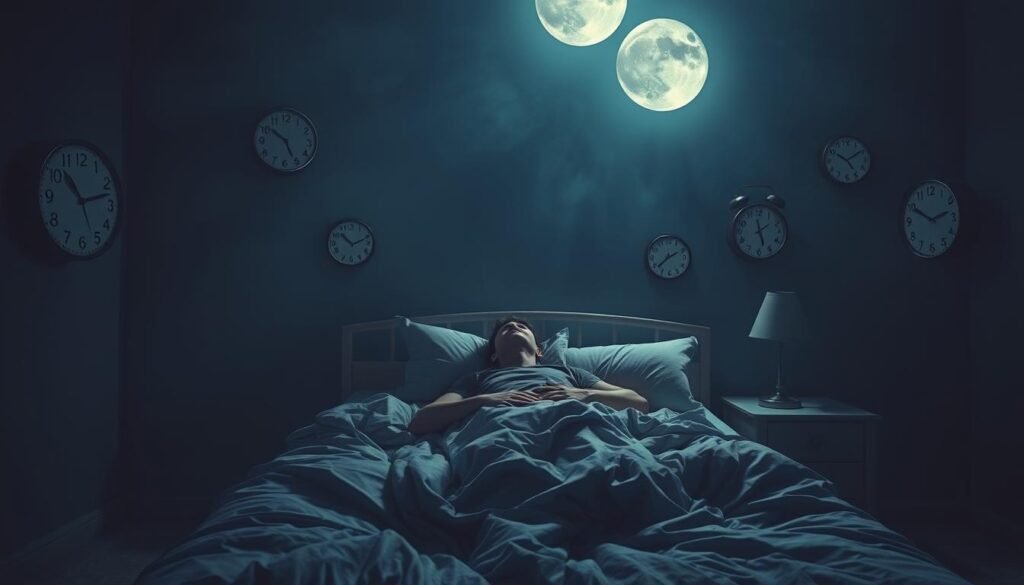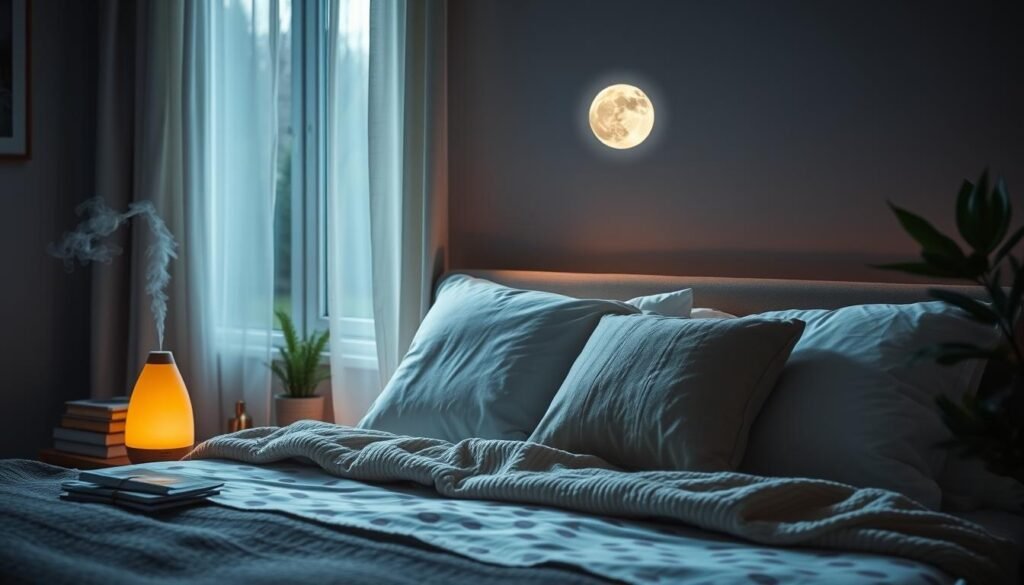About 30% of adults face short-term insomnia at some point. This fact shows many people suddenly struggle to sleep. When this happens, it’s tough to pinpoint why and understand its effects on life. People become irritable and tired due to lack of sleep. Moreover, various factors trigger this sleep issue. This article will explore causes of sudden insomnia and how to find peace again at night.
Key Takeaways
- Insomnia affects about 30% of adults at some stage in their life.
- Older adults, women, and Africans Americans are more prone to insomnia.
- Stress, medical conditions, and lifestyle choices can contribute to sudden insomnia.
- Understanding the differences between acute and chronic insomnia is crucial for effective management.
- Cognitive-behavioral therapy is a valuable approach to address anxiety linked with insomnia.
Understanding Insomnia
Understanding insomnia is key to minding your overall health and well-being. The importance of sleep is massive, as it impacts everything. From how we feel to how well we think and cope. Good sleep helps balance hormones, cement memories, and keep our minds sharp.
The Importance of Sleep
Sleep powers our body’s ability to heal, recover, and get stronger. Without enough, we feel tired, cranky, and can’t think straight. Not sleeping enough can mess with both our minds and bodies. It can cause all sorts of health problems.
What is Insomnia?
Insomnia is a common sleep disorder that makes it hard to fall or stay asleep. It can be short-term, just a few nights, or long-term, lasting three months or more. The causes of insomnia vary from stress to changes in sleep habits, genes, and even our surroundings.
Getting to know the different types of insomnia can help find the right treatment. Insomnia affects people in different ways, making them tired and irritable. This makes daily life harder. For more on insomnia and its types, check this useful link.
Causes of Sudden Onset of Insomnia
Several things can cause sudden insomnia. Stress and anxiety are big reasons why people can’t sleep. Hormonal changes, lifestyle shifts, and various other factors also make it tough to fall asleep.
Common Triggers
What usually triggers insomnia?
- Work or personal stress
- Major life events, like moving or changing jobs
- Bad sleep routines, such as not sleeping at the same time
- Health issues like chronic pain or thyroid problems
- Pregnancy, affecting over 38.2% of expectant moms and causing sleep challenges
Sleep disturbances come from these triggers. A study shows that about one-third of people face sudden insomnia each year. This shows how common it is.
The Role of Stress and Anxiety
Stress from tough situations or personal issues can make sleeping hard. Anxiety also plays a role, with worries keeping the mind active at night. This connection can cause ongoing insomnia, lasting more than three months.
Knowing how mental health affects sleep is key. It helps people find ways to reduce stress and anxiety. This can lead to better sleep and improved quality of life.
It’s important to know what triggers insomnia. This helps in finding the right ways to better sleep and well-being.
Physiological Factors Contributing to Insomnia
It’s key to grasp how our bodies play a role in insomnia. Many medical issues can mess with our sleep. Hormonal shifts also make a big difference in how well we sleep. Spotting these elements is a step toward fixing the problem.
Medical Conditions Impacting Sleep
Some health issues can throw off our sleep. Sleep apnea, diabetes, and thyroid problems are a few examples. Let’s look closer:
- Sleep Apnea: This issue stops your breathing briefly when you’re asleep, hurting your sleep quality.
- Diabetes: Those with diabetes might wake up often due to the need to pee or discomfort, leading to sleep loss.
- Thyroid Disorders: Problems with your thyroid can disturb your sleep, whether it’s too active or not active enough.
Seeing the link between medical conditions and insomnia is crucial. It helps in figuring out and treating the problem.
The Impact of Hormonal Changes
Significant life events like menopause and pregnancy can mess with sleep. Menopause can make you wake up often or sweat at night due to less estrogen. Pregnancy brings sleep trouble because of physical and emotional changes.
Knowing how these hormone changes affect sleep is critical. By addressing both medical issues and hormonal shifts, we can improve sleep and health.
Lifestyle Factors and Sleep Disorders
Lifestyle choices are key in keeping our sleep health on track. What we do every day can greatly affect how well we sleep. This includes facing problems like insomnia due to our daily habits. Notably, drinking caffeine and alcohol are bad for our sleep. Yet, having a regular sleep schedule is just as important.
Effects of Caffeine and Alcohol
Caffeine is found in coffee, tea, and many soft drinks and can keep you awake. Drinking it before bed can make it hard to fall or stay asleep. It’s a fact that about 30% of adults experience insomnia symptoms. Many of them drink caffeine often.
Alcohol might make you feel sleepy at first but it actually leads to bad sleep and feeling tired the next day. Studies show that habits like these play a big part in insomnia. It’s vital to limit these substances for better sleep management.
The Importance of a Sleep Routine
Having a fixed sleep schedule helps set your body’s clock, improving your sleep. Experts say sticking to a sleep routine improves sleep cleanliness. It ensures you get 7-8 hours of sleep each night – crucial for adults. Bad sleep habits and stress can increase your risk of insomnia. This highlights why a good sleep routine is necessary.
To summarize, there are several habits that help keep a healthy sleep routine:
- Going to bed and waking up at consistent times.
- Avoiding caffeine and alcohol in the evening.
- Creating a calm, comfortable sleep environment.
- Engaging in relaxing activities before bed such as reading or meditation.
- Limiting screen time from electronic devices closer to bedtime.
Addressing caffeine’s effect and having a regular sleep schedule helps improve sleep quality. These actions are key for a better night’s sleep and overall health.
Environmental Factors Causing Sleeplessness
The environment where you sleep greatly affects how well you can sleep. Many things can disturb this important process. Managing these disturbances can improve your health and well-being significantly.
Distracting Noises and Lights
Unwanted sounds, like traffic, barking dogs, or loud neighbors, can interrupt your sleep. People living in noisy areas often struggle to fall and stay asleep. Likewise, too much light can upset your body’s sleep schedule. It’s key to have a dark, quiet place to sleep to avoid these issues. Losing sleep to noise and light adds to long-term sleep loss.
Comfort of the Sleeping Environment
Having a comfortable place to sleep is key for a good night’s rest. The right mattress, cozy pillows, and the room’s temperature greatly affect how well you sleep. A cool, dark, quiet room helps you sleep better. Studies show having nature nearby means less trouble sleeping. Creating the right sleep environment is crucial for your health and improving sleep quality. Making small changes can greatly cut down on sleepless nights. Check out this resource for more tips on solving sleep problems.
Understanding Acute Insomnia
Acute insomnia is when sleep issues are short-term, significantly impacting daily life. It’s key to know about acute insomnia to find good solutions. It usually starts because of stress or changes around us, unlike chronic insomnia.
What Distinguishes Acute Insomnia from Chronic Insomnia?
Acute and chronic insomnia both make sleeping hard, but they are different. Acute insomnia is brief, from a few days to weeks. But chronic insomnia lasts longer, happening at least three nights a week for over three months. Knowing the difference helps in choosing the right treatment.
Duration and Symptoms of Acute Insomnia
The length of insomnia is important to tell acute and chronic apart. Acute insomnia comes from immediate issues, while chronic is from long-term sleep problems. Symptoms of acute insomnia include:
- Difficulty falling asleep
- Frequent awakenings during the night
- Waking up too early and being unable to return to sleep
Acute insomnia can cause irritability, less energy, and trouble thinking clearly. Learning about it is crucial for managing sleep well.

The Impact of Sleep Deprivation
Understanding how lack of sleep affects us is key to staying healthy. Not sleeping well can harm both your body and mind. A staggering 50 to 70 million people in the U.S. struggle with sleep problems, showing how big the issue is.
Physical Health Effects
Not getting enough sleep can lead to many health issues. Being sleep deprived on a regular basis is tied to:
- Cardiovascular disease: People not sleeping enough have a 45% higher risk of heart problems.
- Type 2 diabetes: Those who don’t sleep well are three times more likely to get this illness.
- Obesity: Lack of sleep messes with hunger hormones, causing weight gain.
- Weakened immune function: You need sleep to keep your immune system strong and fight off sickness.
- Inflammation: Not sleeping enough can make your body more inflamed, which is bad for your health.
Mental Health Consequences
The impact on mental health from not sleeping is worrying. Research shows that:
- Anxiety: Sleep loss can greatly increase how anxious you feel.
- Depression: Not sleeping enough can make you 50% more likely to feel depressed.
- Cognitive impairment: It makes it harder to think clearly and make decisions.
- Decreased quality of life: It leads to mood swings, less socializing, and unhappiness with life.
With at least 18% of adults not getting enough sleep, it’s important to focus on sleeping better. Adopting good sleep habits and knowing how lack of sleep affects us can help us live healthier. Recognizing these impacts shows why good sleep is vital for both body and mind.
| Physical Health Effects | Implications |
|---|---|
| Cardiovascular Disease | 45% higher risk due to chronic sleep deprivation |
| Type 2 Diabetes | Three times more likely to develop |
| Obesity | Disruption of appetite-regulating hormones |
| Weakened Immune System | Increased susceptibility to illnesses |
| Increased Inflammation | Linked to various health issues |
Effective Solutions for Sudden Onset of Insomnia
Dealing with sudden insomnia can be tough. Effective solutions improve sleep quality and well-being. Adopting sleep hygiene and cognitive behavioral therapy (CBT-I) for insomnia are key.
Sleep Hygiene Practices
Good sleep hygiene is vital for those with sleep struggles. Effective tactics include:
- Establishing a regular sleep schedule: Sleeping and waking up at the same time daily helps regulate your internal clock.
- Creating a soothing bedtime routine: Reading or taking a warm bath signals your body to relax.
- Optimizing the sleep environment: A dark, quiet, and comfy space enhances relaxation.
- Avoiding stimulants: Cutting down on caffeine and alcohol, especially before bed, aids sleep quality.
Cognitive Behavioral Therapy for Insomnia
CBT-I tackles unhelpful thoughts and behaviors about sleep. This program includes:
- Identifying thoughts: Recognizing and challenging negative beliefs about sleep helps overcome mental blocks.
- Behavioral interventions: Methods like stimulus control and sleep restriction reset your sleep habits.
- Relaxation training: Methods to ease anxiety can make your nights restful.
- Education about sleep: Learning about sleep cycles and needs offers insights for better habits.
Incorporating these solutions can vastly improve sleep hygiene. Combining sleep hygiene with CBT-I helps regain sleep control and boosts health.

| Sleep Hygiene Practices | Cognitive Behavioral Therapy for Insomnia |
|---|---|
| Establish a consistent sleep schedule | Identify and challenge negative thoughts about sleep |
| Create a relaxing bedtime routine | Utilize behavioral interventions such as sleep restriction |
| Optimize the bedroom environment | Implement relaxation techniques to reduce anxiety |
| Avoid stimulants before bedtime | Gain knowledge about sleep patterns and needs |
Medical Treatments for Insomnia
Insomnia can really mess up daily activities. That’s why it’s key to look at all medical treatments out there. You have prescription drugs and natural ways to try. Each kind helps with sleep problems in its own way.
Prescription Medications Overview
There are many prescription drugs for insomnia. They are mainly sedative-hypnotics for short-term help. Ambien, Lunesta, and Rozerem are a few examples. They each meet different needs.
While these drugs can make it easier to fall asleep, they’re not for long-term use. Using them for too long can lead to problems like dependency and breathing issues. Doctors often suggest mixing these drugs with strategies like Cognitive Behavioral Therapy for better results.
Natural Remedies and Alternatives
Some people prefer not to use prescription drugs. Natural remedies can help improve sleep without the downsides of meds. Sticking to a sleep schedule, exercising, and relaxing before bed are all effective.
Herbal options like melatonin and valerian are also popular. They can help adjust your sleep patterns more naturally. Acupuncture and meditation are other alternatives. They offer a more whole-body approach to managing sleep issues.
When to Seek Professional Help
It’s vital to know when to get help for insomnia to better your health and life. Look out for the Signs to Consult a Doctor if sleep problems continue. Symptoms like ongoing insomnia, always feeling tired in the day, and mental health issues are red flags. They could mean there’s a deeper issue that needs a doctor’s look.
Signs That Consult a Doctor
Insomnia can affect more than just how you sleep. It can lead to serious problems such as depression, anxiety, and heart issues. If you find it hard to sleep well three nights a week for over three months, it might be time to seek help. Keep an eye out for these signs:
- Trouble sleeping even after trying to fix it on your own
- Feeling tired during the day, mood swings, or trouble thinking clearly
- Struggling to keep a good sleep routine
Getting Professional Help for Insomnia can lead you to solutions. This might mean therapy or changes in your daily habits to sleep better.
Evaluating Underlying Conditions
A health expert can find out if other issues are causing your insomnia. Things like your age, how you live, and certain health conditions matter a lot. They might do some tests to figure this out. These could involve:
| Condition | Impact on Sleep |
|---|---|
| Anxiety Disorders | Can make you worry a lot at night, making it hard to sleep. |
| Depression | May change how you sleep, causing too much or too little sleep. |
| Sleep Apnea | Leads to breathing stopping and starting, ruining sleep quality. |
| Hormonal Imbalances | May cause insomnia, especially in women going through menopause. |
Knowing about these issues can shed light on your sleep challenges. It helps in making a plan that works for you.

Conclusion
Almost one-third of people face sudden insomnia every year. It’s a serious issue that can hurt our body and mind. About 10% suffer from chronic insomnia, affecting sleep for months. It’s clear we need to act fast and find solutions.
To beat sudden insomnia, changing our lifestyle and getting professional help is key. Stress, the environment, and health problems can cause insomnia. That’s why we must find out why it’s happening quickly. Helpful research from the American Academy of Sleep Medicine can show us the way to better sleep and happiness.
Putting sleep first is essential for staying healthy. Knowing the signs of insomnia and getting help early is important. Quick action helps fix sleep issues and improves life quality. That’s why understanding and handling sudden insomnia is important for all.